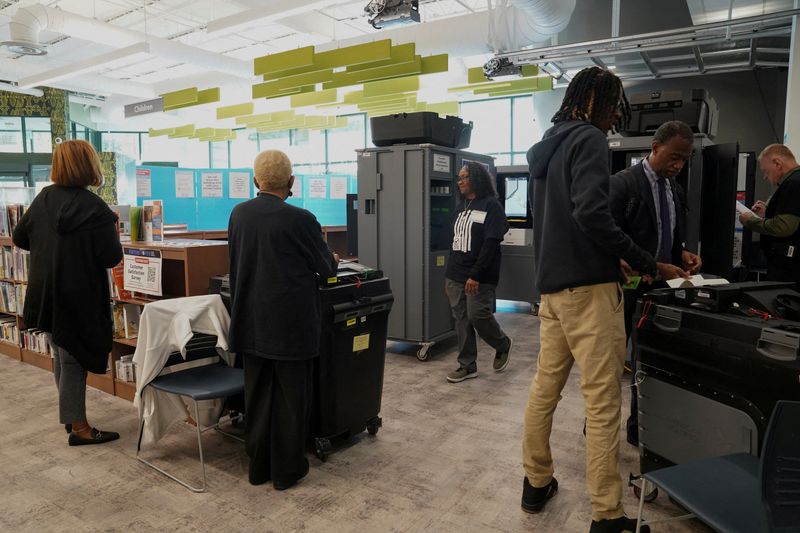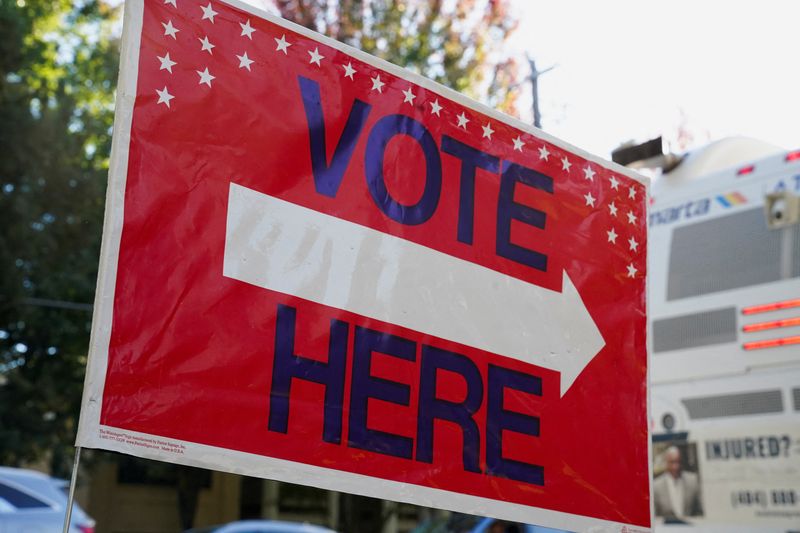By Luc Cohen and Jack Queen
(Reuters) -A judge on Wednesday overturned controversial changes to Georgia election rules made by a Republican-controlled state board, the latest defeat for allies of Donald Trump seeking to change how the state's votes are counted in the Nov. 5 U.S. presidential election.
Judge Thomas Cox struck down a half-dozen new rules that were described by Republicans as necessary election security measures but opposed by Democrats, who said they were aimed at impeding certification of results in a state that could be crucial in selecting the next president.
Cox said the rules, including ones that would have empowered local officials to investigate irregularities and examine troves of documents related to the vote, contradicted state law.
"The rules at issue exceed or are in conflict with specific provisions of the Election Code. Thus, the challenged rules are unlawful and void," Cox wrote.
Cox's ruling is final, though it could be appealed. The judge directed the election board to immediately remove the new rules from its rolls and inform election officials that they were invalid.
A representative for the Georgia State Election Board did not immediately respond to a request for comment.
Georgia, where early voting began in record numbers on Tuesday, is one of seven closely contested states that are expected to determine the winner of the presidential race between Democrat Kamala Harris and Republican Trump. U.S. presidential elections are decided through state-by-state results, not by a majority in the national popular vote.
Cox's ruling is the third Georgia court loss in two days for Trump's allies, who have faced stiff resistance trying to make last-minute changes to the state's election rules.
On Tuesday, a different judge temporarily halted a rule requiring Georgia poll workers to hand count ballots and separately ruled that county officials were required to certify results.
JUDGE SAYS BOARD OVERSTEPPED AUTHORITY
Wednesday's ruling was handed down in a case brought by Eternal Vigilance Action, a Republican-founded advocacy group that opposed the rule changes on constitutional grounds. The case closely mirrored a separate lawsuit by Democrats, which is pending.
At issue were rule changes that would have empowered county election board members to investigate discrepancies between the number of ballots cast and voters in each precinct, and examine troves of election-related documents before certifying their results.
Cox, in an 11-page order, in addition to concluding that the rules contradicted the state Election Code, found that the board overstepped its legal authority in several ways.
The board's 3-2 vote was powered by three allies of Trump, who lost to Democrat Joe Biden in Georgia in the 2020 election and made false claims of widespread voting fraud. Some senior Republicans continue to refuse to say that Biden was fairly elected in 2020.
The board's moves drew bipartisan criticism. The conservative group that brought the case on Sept. 11, Eternal Vigilance Action, argued the Georgia board exceeded its legal authority in making the changes.
Republican Brad Raffensperger, who as secretary of state is Georgia's top election official, has said that the election board's "11th-hour" changes would damage voter confidence and burden election workers.
States must certify their voting results - confirming the accurate tabulation of the votes cast - as part of the process of determining a presidential election's outcome.
Representatives of the Harris campaign did not respond to a request for comment.
Republican National Committee spokesperson Claire Zunk said in a statement that the recent rulings in Georgia were "judicial activism and election interference."
In a separate case it filed over the rule changes, the Democratic National Committee said that Georgia's election board sought to turn the act of certification into "a broad license" for officials at the county level "to delay certification or block it altogether in a hunt for purported election irregularities." That case is pending.
The Democrats noted that certification of election results is mandatory under state law, and that other avenues exist to contest disputed results.

The board's majority has said the various new rules are intended to make the election more secure and transparent. Trump, seeking a return to the presidency, has praised his three allies on the board as "pit bulls."
Trump supporters stormed the U.S. Capitol in January 2021 in a failed bid to prevent Congress from certifying the voting results from November 2020 election. Democrats now are accusing Republicans in various states of seeking to delay or prevent certification of voting results unfavorable to Trump.
